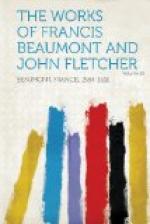No vast uncivill bulke swells any Scene,
The strength’s ingenious, a[n]d the vigour cleane;
None can prevent the Fancy, and see through
At the first opening; all stand wondring how
The thing will be untill it is; which thence
With fresh delight still cheats, still takes the sence;
The whole designe, the shadowes, the lights such
That none can say he shelves or hides too much:
Businesse growes up, ripened by just encrease,
And by as just degrees againe doth cease,
The heats and minutes of affaires are watcht,
And the nice points of time are met, and snatcht:
Nought later then it should, nought comes before,
Chymists, and Calculators doe erre more:
Sex, age, degree, affections, country, place,
The inward substance, and the outward face;
All kept precisely, all exactly fit,
What he would write, he was before he writ.
’Twixt Johnsons grave, and Shakespeares lighter sound
His muse so steer’d that something still was found,
Nor this, nor that, nor both, but so his owne,
That ’twas his marke, and he was by it knowne.
Hence did he take true judgements, hence did strike,
All pallates some way, though not all alike:
The god of numbers might his numbers crowne,
And listning to them wish they were his owne.
Thus welcome forth, what ease, or wine, or wit
Durst yet produce, that is, what Fletcher writ.
Another.
Fletcher, though some call it thy fault,
that wit
So overflow’d thy scenes, that ere
’twas fit
To come upon the Stage, Beaumont was
faine
To bid thee be more dull, that’s
write againe,
And bate some of thy fire, which from
thee came
In a cleare, bright, full, but too large
a flame;
And after all (finding thy Genius such)
That blunted, and allayed, ’twas
yet too much;
Added his sober spunge, and did contract
Thy plenty to lesse wit to make’t
exact:
Yet we through his corrections could see
Much treasure in thy superfluity,
Which was so fil’d away, as when
we doe
Cut Jewels, that that’s lost is
jewell too:
Or as men use to wash Gold, which we know
By losing makes the streame thence wealthy
grow.
They who doe on thy worker severely sit,
And call thy store the over-births of
wit,
Say thy miscarriages were rare, and when
Thou wert superfluous, that thy fruitfull
Pen
Had no fault but abundance, which did
lay
Out in one Scene what might well serve
a Play;
And hence doe grant, that what they call
excesse
Was to be reckon’d as thy happinesse,
From whom wit issued in a full spring-tide;
Much did inrich the Stage, much flow’d
beside.
For that thou couldst thine owne free
fancy binde
In stricter numbers, and run so confin’d
As to observe the rules of Art, which
sway
In the contrivance of a true borne Play:




